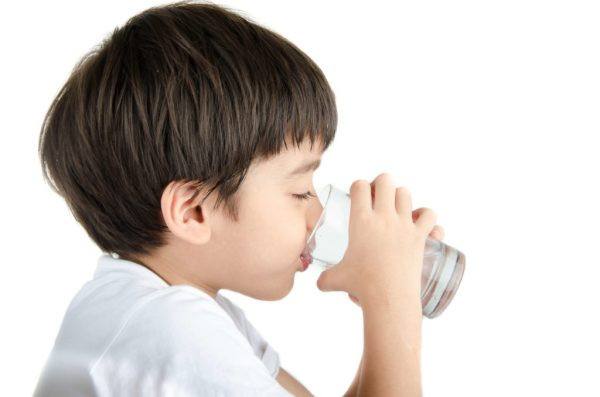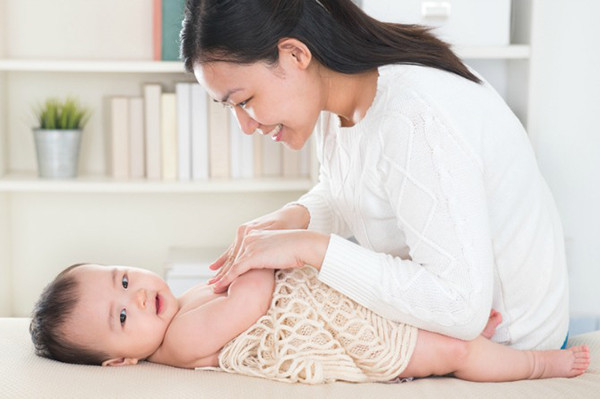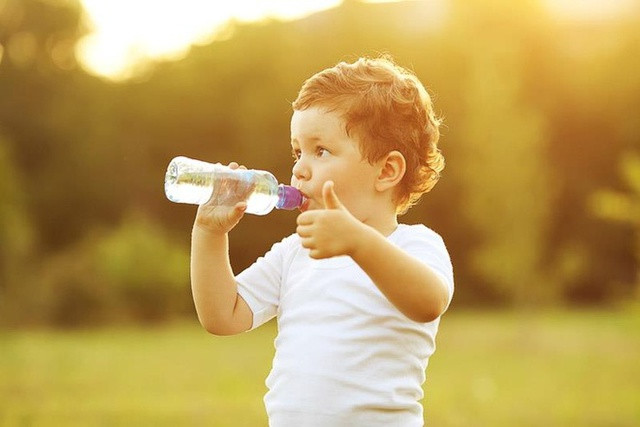How to give children water properly and healthily?
How to give water to children properly? In fact, not many mothers give water to their children properly while water is very necessary for the body.
1. How much water do children need?
Content
1. How much water do children need?
2. How to give water to children?
3. Drinks that should be limited for children to drink
4. Signs of dehydration in children
5. Keep your child hydrated when playing sports, exercising or in hot weather.
Water is essential for the body, and water is the best beverage choice for children with zero calories. Water keeps joints, bones and teeth healthy, helps blood circulation and can help children maintain a healthy weight as adults. Drinking enough water will improve mood, memory and attention in children.
When your baby is around 6 months old, they can start drinking water. They only need about 125-250ml of water a day until they are one year old, as the rest of their fluids come from breast milk or formula.
To stay well hydrated, children aged 1-3 need about 4 cups of fluids a day, including water or milk. This number increases as children get older: to about 5 cups for children aged 4-8 and 7-8 cups for older children.
It should be noted that this amount varies from child to child and may need to be adjusted depending on activity level and environmental conditions such as temperature and humidity.
2. How to give water to children?

Many children do not like drinking plain water because they find it bland and unappealing. There are many ways to help children drink water healthily and stay hydrated throughout the day. Make water a habit by drinking together as a family and getting your child into the habit of drinking water before he or she is thirsty.
Here are a few tips to make drinking water and staying hydrated more enjoyable:
- Add lemon, berries, cucumber or mint to add flavour. This is an easy way to energise the whole family and kids.
- Some of the best fruits and vegetables with high water content are cucumbers, zucchini, lettuce, celery, and tomatoes. Top fruits include watermelon, cantaloupe, strawberries, blueberries, and grapefruit.
3. Drinks that should be limited for children to drink
Water and milk are all children need. So don’t give your child many other drinks, such as bottled drinks, which often contain more sugar than a child needs in a day and can contribute to poor health. Here are some things to avoid:
Sugary drinks:Don't give sugary drinks to children under 2. And try to limit them as much as possible for older children. Drinks like sports drinks, soft drinks, etc. discourage the habit of drinking water and can add "empty calories" to the diet. These drinks can make children less hungry for the nutritious foods their bodies really need. Added sugar can lead to excess weight gain, tooth decay, diabetes, etc.
Fruit juice:Even 100% fruit juice should be strictly limited. While it may contain some vitamins, these drinks are high in sugar and calories and low in the healthy fiber found in whole fruit. Because of their sweetness, when you give your child juice, it can be difficult to get him or her to drink plain water.
Note, children under one year old should not drink any fruit juice. Children aged 1-3 years should not drink more than 120ml of fruit juice per day. For older children, only fruit juice should be used if it does not contain whole fruit. Children aged 4-6 years, no more than 180ml per day and for children aged 7-8 years, no more than 250ml per day.
MSc. Dr. Chau To Uyen, Children's Hospital 1, Ho Chi Minh City
There are many factors that affect children's daily water needs, such as hot weather, activity levels, medical conditions with fever, etc. However, if children are in normal health, parents only need to calculate the amount of water their children drink each day by counting glasses of water.
Flavored milk:Although calcium and vitamins are found in milk, flavored milk can be much higher in sugar. Avoiding added sugars from these products can help curb a child's preference for sweetness, which can turn them off from regular milk.
Drinks with stevia or artificial sweeteners: Because the health risks of stevia and artificial sweeteners for children are not well understood, it is best to avoid these drinks. Instead, keep water available to promote healthy hydration.
4. Signs of dehydration in children

In addition, parents must know the signs of dehydration in children so they can handle it quickly.
Babies from 0-6 monthsshould only be fed breast milk or formula. Supplemental fluids are not recommended at this age. Around 6 months, complementary foods and small amounts of water can be added. If you are concerned that your baby is not getting enough fluids, ask your pediatrician. The most noticeable symptoms of dehydration at this age are fewer wet diapers, less frequent diaper changes, excessive sleepiness, sunken fontanelles, and no tears when crying.
For older childrenmore, your child can tell you how he or she feels better. However, it is still important to pay attention because children who are playing often have difficulty stopping. Symptoms of dehydration in older children include dry or sticky lips, sleepiness and irritability, flushed skin, and little or dark urine. Note that urine should be pale yellow, almost clear.
In adolescents, dehydration is a big risk, especially if the exercise is intense. The most common signs in this age group are dry lips and mouth, dizziness, cramps, thirst, dark or scanty urine, headache, rapid pulse, flushed skin, and feeling too hot or cold.
5. Keep your child hydrated when playing sports, exercising or in hot weather.

During sports or other physical activities, your child may need extra fluids to prevent dehydration. Make sure your child drinks water before, during, and after practice or competition.
When exercising vigorously or sweating, children aged 9-12 usually need to drink around 90-240ml of water every 20 minutes to stay hydrated. Teenagers need to drink around 1-1.5l of water every hour. It is good to drink enough water in the days and hours leading up to the activity. Although playing in the park may not be as intense as exercise or physical activity, if your child is sweating, it is still important to ensure adequate hydration.
If prolonged exercise causes your child to sweat a lot, electrolytes may need to be supplemented.
